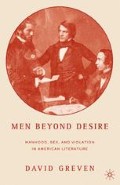Abstract
In its depiction of its unnamed narrator’s disenfranchisement from both heterosexual and fraternal intimacies, Edgar Allan Poe’s famous story “The Fall of the House of Usher” makes an intriguing point of comparison to Hawthorne’s fictions.1
Access this chapter
Tax calculation will be finalised at checkout
Purchases are for personal use only
Preview
Unable to display preview. Download preview PDF.
Notes
Edgar Allan Poe, “The Fall of the House of Usher,” Selected Writings, ed. David Galloway (New York: Penguin, 1977), 138–57. All citations are from this edition and are noted parenthetically in the text.
I have to disagree slightly, then, with Poe’s finest critic, Allen Tate, who writes, “The mysterious exaltation of spirit which is invariably the unique distinction of his heroes and heroines is not quite, as I have represented it, bodyless. It inhabits a human body but that body is dead. The spirits prey upon one another with destructive fire which is at once pure of lust and infernal.” Though this is a marvellous description of the effects of Poe’s fiction, it nevertheless empties the peculiar lustfulness from Poe that is crucial to the power of “Usher.” The narrator maintains a steady, sorrowful solemnity of tone and manner throughout; but his solemnity is no match for the lurid, grandiloquent energy of Roderick Usher, enflamed by his lust for Madeline. The narrator is never a participant in this lust, and always an excluded Other before it. Whatever desires he brings to the scene remain buried alive. The lusty antics surround and overwhelm him as they create a wall-to-wall atmosphere of dramatic lust from which the narrator is pointedly excluded. The only real irony in a story that is almost never read “straight”—but should be—is the fact that Poe wrote it while living in Philadelphia, the mythic City of Brotherly Love. See Allen Tate, Essays of Four Decades (Chicago, IL: The Swallow Press, 1968), 390. Endogamous Usher relations signify something else for another critic, the terror of the mirrored disease: “[We can see] Madeline’s resemblance to Usher as the locus of his own terror: she mirrors his own fate and provides an image of his own eventual disintegration.” For J. Gerald Kennedy, the vengeful return of the dead woman confronts the romantic protagonist with the knowledge of the certainty and inescapability of death that he has futilely attempted to repress. By burying Madeline, Usher has repressed death, has failed to “face the shadow.” The return of this repressed knowledge of death embodied in the “enshrouded figure” of Madeline is “inevitable” and “fatal.”
See Kennedy, Poe, Death, and the Life of Writing (New Haven, CT: Yale UP, 1987) 86, 199.
Philip F. Gura, ed., Buried from the World: Inside the Massachusetts State Prison, 1829–1831: The Memorandum Books of the Rev. Jared Curtis (Boston, MA: Massachusetts Historical Society, 2001). I quote from Gura’s “Introduction,” iv–lxxii.
Jean L. Silver-Isenstadt, Shameless: The Visionary Life of Mary Gove Nichols (Baltimore: Johns Hopkins UP, 2002), 8.
For a characteristically incisive discussion of the crucial distinctions between Sylvester Graham, free-love, and the “complex marriage” system of John Humphrey Noyes, founder of colonies in Oneida and Putney, see Nissenbaum, 165–69. For an in-depth study of Noyes and Oneida, see Mary P. Ryan’s well-regarded Cradle of the Middle Class: The Family in Oneida County, New York, 1790–1865 (New York: Cambridge UP, 1981).
Mary Gove Nichols, Reminiscences of Edgar Allan Poe (1863; reprint, New York: The Union Square Book Shop, 1931). All subsequent quotations are noted parenthetically and are from this edition.
Copyright information
© 2005 David Greven
About this chapter
Cite this chapter
Greven, D. (2005). “Madman!”. In: Men Beyond Desire. Palgrave Macmillan, New York. https://doi.org/10.1057/9781403977113_6
Download citation
DOI: https://doi.org/10.1057/9781403977113_6
Publisher Name: Palgrave Macmillan, New York
Print ISBN: 978-1-349-53107-3
Online ISBN: 978-1-4039-7711-3
eBook Packages: Palgrave Literature & Performing Arts CollectionLiterature, Cultural and Media Studies (R0)

